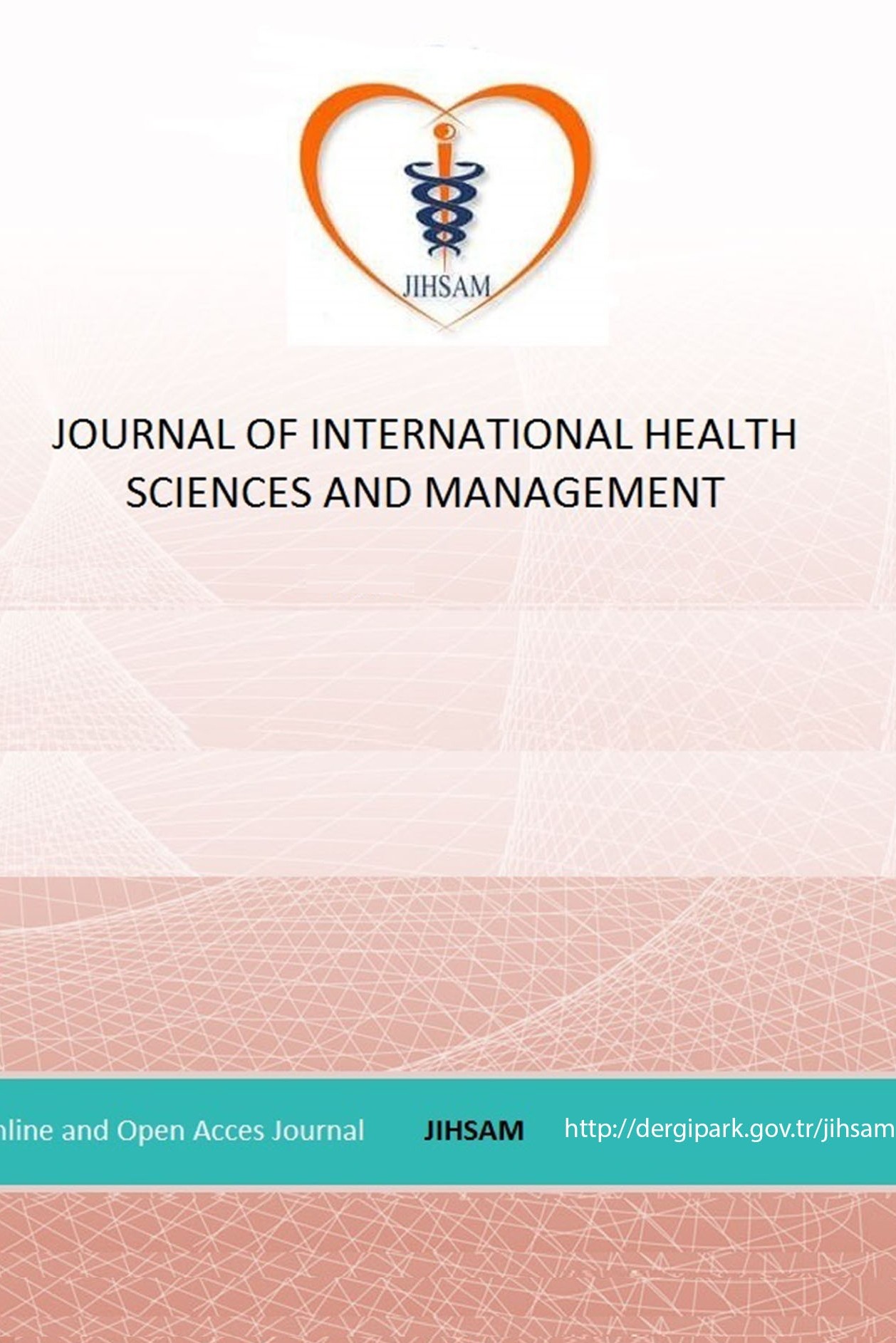Effect of health education about personal hygiene on student’s health in primary school
Effect of health education about personal hygiene on student’s health in primary school
Health education Personal hygiene, Student’s health,
___
- Abdalazim Hassan, H., Abd Alla, A. B., Elfaki, T. E. M., & Saad, M. B. E. A. (2020). Frequencies of gastrointestinal parasites among students of primary school in Al Kalakla Locality, Khartoum State, Sudan: A cross-sectional study. F1000Research, 8. https://doi.org/10.12688/f1000research.20610.3
- Barata, A., & Maricoto, T. (2019). Teaching children about hygiene: A primary prevention experience in Portugal. Journal of Family Medicine and Primary Care, 8(3), 1017. https://doi.org/10.4103/jfmpc.jfmpc_428_18
- Boshra, A., Abdalla, S. M., & Mohamed, E. Y. (2017). Effect of Innovative School Health Program on the Student ’ S Effect of Innovative School Health Program on the Student ’ S Nutritional Status in Basic Schools in Khartoum State 2011-2012. 3(March), 51–56. https://doi.org/10.20959/wjpps20173-8768
- David, M. M., Sujitra, V., Arulmozhi, E., & Navaneetha, D. M. (2020). Effectiveness of Video Assisted Teaching and Demonstration on Knowledge Regarding Personal Hygiene Among School Children. International Journal of Innovative Science and Research Technology, 5(7), 1225–1227. https://doi.org/10.38124/ijisrt20jul856
- Effect, T. H. E., Health, O. F., On, C., In, T., & Schools, P. (2020). Indonesian Journal of Global Health Research. Indonesian Journal of Global Health Research, 2(3), 217–224. https://doi.org/10.37287/ijghr.v2i4.250
- Hailegebriel, T. (2017). Prevalence of intestinal parasitic infections and associated risk factors among students at Dona Berber primary school, Bahir Dar, Ethiopia. BMC Infectious Diseases, 17(1), 1–8. https://doi.org/10.1186/s12879-017-2466-x
- Sarkar, M. (2013). Personal hygiene among primary school children living in a slum of Kolkata, India. Journal of Preventive Medicine and Hygiene, 54(3), 153–158. https://doi.org/10.15167/2421-4248/jpmh2013.54.3.401
- Shekhawat, R., Sodha, V. S., Sharma, N., & Verma, M. (2019). Knowledge and practice regarding personal hygiene among students of government schools of Bikaner, Rajasthan. International Journal of Advanced Community Medicine, 2(2), 108–111. https://doi.org/10.33545/comed.2019.v2.i2b.15 Sitotaw1, B., & Yezina Gebeyaw. (2020). 1,* , 2 3 2. 13(June), 131–146.
- Suliman, M. A., Tamomh, A. G., Magboul, A. M., Mohammed, H. Y., Bakhit, H. A., Altoum, S. A., & Ahmed, S. M. (2019). Prevalence of Intestinal Parasitic Infections and Associated Risk Factors among School Children in White Nile State, Sudan Toxoplasmosis View project schistosomiasis View project Prevalence of Intestinal Parasitic Infections and Associated Risk Factors am. Journal of Infectious Disease and Diagnosis, 4(1), 8–11. https://doi.org/10.4172/2576-389X.1000125
- Widyasari, V., Widyasari, V., Prabandari, Y. S., & Utarini, A. (2020). Training intervention to improve hygiene practices in Islamic boarding school in Yogyakarta, Indonesia: A mixed-method study. PLoS ONE, 15(5 May), 1–13. https://doi.org/10.1371/journal.pone.0233267
- Yayın Aralığı: Yılda 2 Sayı
- Başlangıç: 2015
- Yayıncı: Sedat BOSTAN
ANALYSIS OF SOME CONCEPTS RELATED TO THE ENVIRONMENT AND HEALTH WITH THE N-GRAM METHOD
Ali ÇİFTÇİ, Alaaddin VURAL, Mustafa Nuri URAL
EVALUATION OF THE SOCIOECONOMIC STATUS IN THE COVID-19 PANDEMIC PROCESS
Yunus Emre ÖZTÜRK, Hilal AKMAN DÖMBEKCİ, Müjdat YEŞİLDAL
The Assessment of Turkey’s Lack of Resilience to Disasters and Hazards with IDB Indicator System
Ünal YAPRAK, Turgut ŞAHİNÖZ, Saime ŞAHİNÖZ
Effect of health education about personal hygiene on student’s health in primary school
Amira BOSHRA, Abdalbasit MARIOD
THE PERCEPTIONS OF NURSES ABOUT PATIENT SAFETY CULTURE: AN EXAMPLE PROVINCE IN NORTH EAST OF TURKEY
Aysun BAYRAM, Afife YURTTAŞ, Mağfiret KARA KAŞIKÇI
Mustafa IŞIK, Onur YARAR, Didem SÖYLEMEZ SUR
DOES BUSİNESS SATİSFACTİON AFFECT THE LİFE SATİSFACTİON? EXAMPLE OF HEALTH SCİENCES ACADEMİCS
Yasemin URGANCI, Cansu YILMAZ, Sultan ÇEÇEN, Hanife ÖZÇELİK
THE IMPACT OF PERCEIVED SOCIAL SUPPORT ON PERCEPTION OF HEALTH STATUS IN ISPARTA
